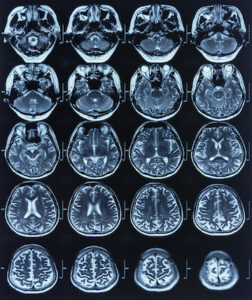Reno Brain Injury Lawyer
Helping Clients With Traumatic Brain Injuries and Chronic Traumatic Encephalopathy

We have now begun to learn, however, about the degenerative brain disease known as chronic traumatic encephalopathy (CTE), a condition likely caused by frequent, “micro” traumas sustained by the brain. With this emerging awareness of CTE comes the recognition that, in some cases, CTE patients may have legal rights to recover compensation for the long-term damage done to their brains that resulted in CTE.
If you have received a brain disease diagnosis that points to TBI or CTE as the likely cause, the team at Benson & Bingham in Reno wants to speak with you about your legal rights. Contact us today and read on to learn more about our brain injury and CTE-focused legal practice.
What is CTE?
Medical professionals still know relatively little about CTE, compared to other known brain diseases. Researchers at Boston University’s CTE Center believe that CTE is connected to sustaining repeated brain trauma (concussions and “micro”-concussions) over time. CTE was initially pinpointed as a condition found in professional athletes who played sports involving frequent blows to the head, such as football, hockey, and boxing. Increasingly, however, it appears that CTE can emerge in athletes whose playing careers ended in high school or college; in other words, any history of frequent “minor” concussions or blows to the head can put a person at risk of CTE.
Researchers have not been able to determine how many blows to the head trigger CTE. Other factors, including genetics, could play a role in whether someone develops CTE after one or more hits to the head.
When doctors first identified CTE, they thought the disease did not emerge until later in life. However, according to the Concussion Legacy Foundation, evidence suggests CTE symptoms could appear in people as young as 17 years. For those who suffer from CTE later in life, early symptoms could appear in a patient’s late 20s or early 30s.
Symptoms of CTE
The Mayo Clinic believes that CTE causes the brain to waste away, or atrophy, interfering with the ability of nerve cells in the brain to communicate with one another.
Researchers have not yet developed a way to test for CTE while a patient is alive. Because the condition’s symptoms mimic those of other degenerative brain diseases, doctors cannot definitively diagnose CTE in a patient until after the patient dies and an autopsy can be performed on the patient’s brain.
Instead, in giving a patient a potential CTE diagnosis, doctors look for a constellation of symptoms appearing in a patient with a history of repeated head traumas. Those symptoms may include:
- A hard time thinking;
- Depression;
- Impulsive behavior;
- Apathy;
- Substance abuse;
- A hard time planning and then carrying out tasks;
- Loss of short-term memory;
- Unstable emotions; and
- Thoughts of suicide/attempting suicide.
If you have a history of blows to your head, such as from playing sports or having a job in which you sustained repeated head injuries that left you feeling foggy or confused at the time, and you begin to experience the symptoms above, be sure to tell your doctor right away. You may have a potential CTE diagnosis, and rights to compensation.
How Brain Injuries Occur
Traumatic brain injuries—those that cause acute symptoms immediately—result from blows, jolts, or penetrating injuries to the head. Motor vehicle accidents and accidental falls are the two most common events leading to severe TBI. So-called “minor” TBIs, or concussions, result from less severe impacts to the head, including those that accompany playing contact sports.
With the emerging awareness of CTE, doctors are beginning to recognize that any series of repeated concussions, even ones so “minor” that they do not display symptoms, may cause CTE to develop later in life. At present, we know that contact sports can increase the risk of CTE. By extension, it seems likely other repetitive head-injury related events, such as exposure to repeated explosions or concussive shockwaves (such as those experienced by soldiers), or a job that regularly rattles your brain (such as might accompany working with heavy machinery), may also contribute to CTE emerging.
Compensation for Brain Injuries
With the help of an experienced Reno, Nevada brain injury lawyer from Benson & Bingham, victims of all types of accidental brain injuries, from a sudden, catastrophic TBI to a slow-emerging CTE diagnosis, can assert their rights to compensation under Nevada law. Although every brain injury has its own unique aspects, victims of accidental brain injuries may seek monetary damages that include:
- Compensation for out-of-pocket costs associated with an accidental brain injury, including past and future medical costs and lost wages;
- Compensation for the life struggles that accompany any kind of brain injury, including pain and suffering and harm done to close personal relationships; and
- In especially difficult cases, punitive damages aimed at punishing the party who caused a brain injury.
Until medical understanding of CTE improves, victims of this long-term brain injury will need significant financial support to adapt their lives to the uncertainties of an emerging and misunderstood diagnosis. Benson & Bingham attorneys empathize with the difficulty of not knowing what life will look like in the future, and aim to ensure their clients receive the maximum compensation they might need to confront that future.
Call Our Reno Brain Injury Attorneys Today
Do not wait to seek help when a brain injury diagnosis, either an acute TBI or a potential diagnosis of CTE that leaves you feeling adrift in a sea of uncertainty. You have rights, and the team at Benson & Bingham has the experience and sophistication to help you enforce them.
Contact us at our Reno location today, or call us at (775) 600-6000, to set up a consultation with a member of our Reno brain injury and CTE legal team. We also serve clients in Lake Tahoe, Sparks, and Carson City.
Free Consultation

